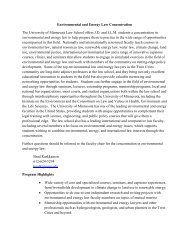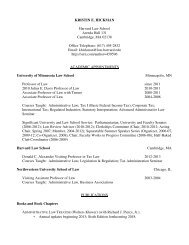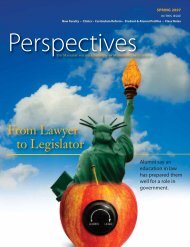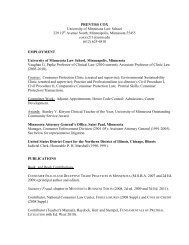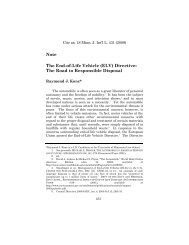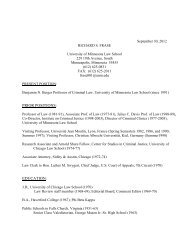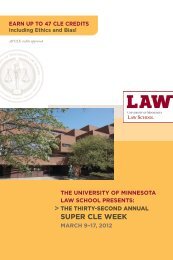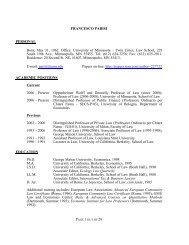Enabling Private Ordering - the University of Minnesota Law School
Enabling Private Ordering - the University of Minnesota Law School
Enabling Private Ordering - the University of Minnesota Law School
You also want an ePaper? Increase the reach of your titles
YUMPU automatically turns print PDFs into web optimized ePapers that Google loves.
80 MINNESOTA JOURNAL OF INT’L LAW [Vol. 18:1<br />
<strong>the</strong> question <strong>of</strong> compensation for such interferences still seems<br />
to be unsettled, 220 English common law accepts that a State<br />
cannot contract away its power to interfere with contracts in <strong>the</strong><br />
public interest. A similar position is endorsed by o<strong>the</strong>r common<br />
law jurisdictions, such as Australia, New Zealand and<br />
Canada. 221<br />
The power <strong>of</strong> <strong>the</strong> State to interfere with contracts based on<br />
a police power exception is also accepted under <strong>the</strong> U. S.<br />
Constitution. 222 In <strong>the</strong> Blaisdell case, <strong>the</strong> U.S. Supreme Court<br />
held, concerning a mortgage moratorium imposed during <strong>the</strong><br />
Great Depression, that:<br />
<strong>the</strong> reservation <strong>of</strong> essential attributes <strong>of</strong> sovereign power is also read<br />
into contracts as a postulate <strong>of</strong> <strong>the</strong> legal order. The policy <strong>of</strong> protecting<br />
contracts against impairment presupposes <strong>the</strong> maintenance <strong>of</strong> a<br />
government by virtue <strong>of</strong> which contractual relations are worth while, –<br />
a government which retains adequate authority to secure <strong>the</strong> peace<br />
and good order <strong>of</strong> society . . . The reservation <strong>of</strong> this necessary<br />
authority <strong>of</strong> <strong>the</strong> state is deemed to be part <strong>of</strong> <strong>the</strong> contract. 223<br />
The Court fur<strong>the</strong>r considered <strong>the</strong> State’s power to interfere<br />
with contractual relationships as part <strong>of</strong> “<strong>the</strong> police power,<br />
[which] is an exercise <strong>of</strong> <strong>the</strong> sovereign right <strong>of</strong> <strong>the</strong> government to<br />
protect <strong>the</strong> lives, health, morals, comfort and general welfare <strong>of</strong><br />
COLIN C. TURPIN & A. TOMKINS, BRITISH GOVERNMENT AND THE CONSTITUTION 705–<br />
07 (6th ed. 2007) (making reference to more recent case law).<br />
220. See Rosalyn Higgins, The Availability <strong>of</strong> Damages for Reliance by a<br />
Government on Executive Necessity, in INTERNATIONAL LAW AND ECONOMIC ORDER:<br />
ESSAYS IN HONOUR OF F. A. MANN ON THE OCCASION OF HIS 70TH BIRTHDAY 21<br />
(Werner Flume et al. eds., 1977).<br />
221. Cf. Newfoundland and Labrador v. Nova Scotia, (Can. v. Can.), [2006] 128<br />
Int’l L. Rep. 435, 446 (2001) (“As a general matter, governments cannot under<br />
Canadian law validly contract so as to fetter <strong>the</strong>ir future executive action . . . .”);<br />
Attorney-General for New South Wales v. Quin (1990) 170 C.L.R. 1, 17 (holding with<br />
reference to earlier case law that “[t]he Executive cannot by representation or<br />
promise disable itself from, or hinder itself in, performing a statutory duty or<br />
exercising a statutory discretion to be performed or exercised in <strong>the</strong> public interest,<br />
by binding itself not to perform <strong>the</strong> duty or exercise <strong>the</strong> discretion in a particular<br />
way in advance <strong>of</strong> <strong>the</strong> actual performance <strong>of</strong> <strong>the</strong> duty or exercise <strong>of</strong> <strong>the</strong> power”);<br />
Petrocorp Exploration Ltd. v. Minister <strong>of</strong> Energy, [1991] 1 N.Z.L.R. 641, 652 (P.C.)<br />
(holding with respect to <strong>the</strong> relationship between contractual obligations and<br />
statutory duties that “<strong>the</strong> contractual fetter would have been ineffective, because it<br />
would have been quite incompatible with <strong>the</strong> proper exercise <strong>of</strong> <strong>the</strong> Minister’s<br />
statutory powers in <strong>the</strong> national interest”).<br />
222. See Bernadette Meyler, Economic Emergency and <strong>the</strong> Rule <strong>of</strong> <strong>Law</strong>, 56<br />
DEPAUL L. REV. 539, 558, n.42 (2007).<br />
223. Home Bldg. & Loan Ass’n v. Blaisdell, 290 U.S. 398, 435 (1934). Cf. Energy<br />
Reserves Group v. Kansas Power & Light Co., 459 U.S. 400, 410 (1983); East New<br />
York Savings Bank v. Hahn et al., 326 U.S. 230, 231 (1945); Veix v. Sixth Ward<br />
Bldg. & Loan Ass’n, 310 U.S. 32, 38 (1940).



